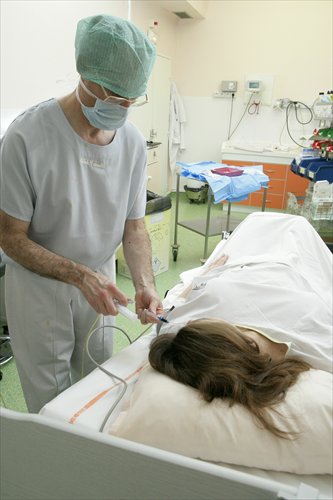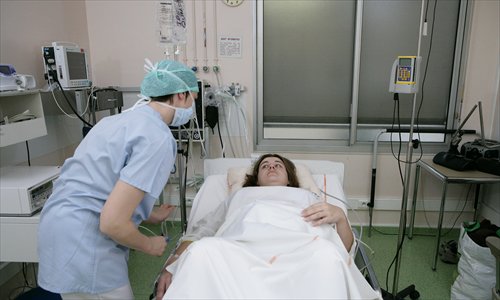Foreigners weigh in on their experiences at Chinese hospitals

More expats are turning to local hospitals with international departments for their medical needs, thanks to these hospitals' lower prices, professionalism and comprehensive care. Photo: IC
It was July of 2010 when Italian expat John Albers (pseudonym) had what he assumed was an allergic reaction: his eyes swelled up and began to throb; the internal pressure was enormous. Albers immediately rushed into an international clinic, which, like a lot of expats, he trusted because it was designed to cater to foreign patients.
However, the clinic didn't have a department that specializes in eye problems, so they had to transfer Albers to the international department of a Chinese hospital.
Albers was worried - he'd heard that Chinese hospitals were chaotic and often delivered sub-standard care. Moreover, as a foreigner, he wasn't sure if he'd know how to navigate the system, or even the reputation of the hospital he was headed to.
To his surprise, though, he ended up having a positive experience.
"Treatment was very professional, fast and efficient," he said.
"The price was reasonable, only around 200 yuan ($30.94), which is much cheaper than what I would have paid at an international hospital. There, it would have cost at least 10 times more, because emergency interventions usually run you no less than 3,000 yuan."
Not that Albers got away scot-free: "What's even more ridiculous was that I had to pay 2,500 yuan to the international hospital for using the ambulance to take me to the Chinese one!"
There's no worse feeling than getting sick in a foreign country and having to seek treatment in a strange, confusing place.
Fortunately, major cities in China like Beijing have an extensive network of medical facilities to choose from, ranging from international hospitals to local hospitals with international departments to more modest affairs.
While international hospitals remain a top choice for many Westerners in Beijing, since they employ Western-trained doctors and are geared toward serving the city's expat population, others are beginning to explore local options with international departments.
The growing number of expats patronizing these hospitals is not only a result of the soaring costs of treatment at international hospitals, but of the increasing number of "half-pats" who lack medical insurance, as well as growing knowledge of the local medical landscape among foreigners, who are more and more likely to opt for local hospitals.
Take the China-Japan Friendship Hospital for example. According to Director of the International Medical Center Zhu Yuqing, of the 300 or so patients that the hospital sees each day, 30 to 40 percent are expats.

Despite the advantages of local hospitals, some foreign patients chafe at cultural differences in the way staff approach patient care. Photo: IC
Lower costs, more comprehensive services
Like Albers, an increasing number of expats are discovering that the international departments of local hospitals are able to offer medical care that's not only less expensive, but also more specialized.
That's because Chinese hospitals are usually much bigger than international hospitals, meaning they have a more comprehensive range of departments, specialists and technologies.
Since his experience with the eye emergency, Albers has started going to local Chinese hospitals for more of his medical needs, even though his insurance covers treatment at international hospitals, because he liked the Chinese doctors and was impressed by their competence.
"Chinese doctors do their job; they are calm and rational and polite without being cheesy," he said. "Chinese doctors can be a bit cold for some foreigners, but they remind me of old-fashioned Italian and French doctors." Having grown up in a family of doctors and pharmacists in Italy, Albers said he appreciates Chinese doctors' manner and professionalism.
He added, "To be honest, I am often annoyed by the over-polite, taking-care-of-everything attitude of American hospitals, which ends up with you spending about five times what is necessary."
Alber was so impressed with his experience at Chinese hospitals that he and his wife, who is French, decided to have their second child at a Chinese maternity hospital.
"Everything was great," he said. "Just sometimes communication was a bit difficult, but their competence was perfect."
Mary Peng, an American who has lived in China for 26 years, has had her fair share of experiences at both international and local hospitals.
Peng said that one of the biggest advantages of local hospitals is that the bigger ones offer a range of departments and specialists, as well as technology that isn't available at smaller and international hospitals, like MRI (Magnetic Resonance Imaging) machines and radiosurgery devices like "gamma knives."
"It's a great place to see specialists for less common conditions," Peng said.
According to Zhu, every year, they receive a lot of patients who are transferred from international hospitals because they can't treat the symptoms.
"We have long-term relationships with some international clinics like International SOS, so when they can't handle some tricky diseases, they will send the patients to our hospital," Zhu said.
Another advantage is that local hospitals are less expensive. Peng explained that while at the international departments of local hospitals, patients may pay 200-300 yuan for registration and an initial visit with the doctor, at international hospitals, the same thing can run them five times that amount. Likewise, tests like CAT (computerized axial tomography) scans generally cost around 2,000 yuan in local hospitals, and as much as 5,000 yuan in international hospitals.
Stephannie Tebow, an American who's lived in Beijing for eight years, learned that painful lesson in 2012 when she had to get an emergency appendectomy.
"I paid 230,000 yuan for an appendectomy in an international hospital, while my friend paid less than 10,000 yuan for a complicated hysterectomy at a local hospital's international department," Tebow said. "And her care was professional and excellent."
Expense is becoming more of a factor for foreigners living in China, as a decreasing percentage of them have medical insurance that covers international hospitals and clinics. That's in large part because fewer foreigners enjoy the kinds of expat packages (including benefits) that were once the norm.
According to a Wall Street Journal report in September 2015, since the global financial crisis in 2007, companies in many Asian countries and regions have been reducing expat packages as part of their cost-cutting measures. Now, only around 30 to 40 percent of the expat population in Asia have expat packages.
International label, Chinese mentality
While many expats are satisfied with the professional care and lower costs of Chinese hospitals, some are still put off by cultural differences in staff members' approach to care and communication.
"In international hospitals, I feel that I get enough time with the doctor, and the quality of information provided to you as a patient is good, which I find more comfortable and reassuring," Peng said.
In local hospitals, meanwhile, there is less doctor-patient communication.
"I remember one time I got a blood test at a local hospital's international department. The doctor told me if the index numbers were not high, I wouldn't have to come back to the hospital again," Peng said. "At an international hospital, the doctor would have explained to me what the index figures meant."
Another reason some expats are reluctant to visit local Chinese hospitals is the complicated registration and payment system, which requires patients to run around between different departments and wait in a number of lines. It can be confusing and also time- and energy-consuming.
Anna Brookes (pseudonym) from the US recalls an incident in which she went to the international department of a local Chinese hospital last year for a chronic sinus problem caused by pollution, but found the process so confusing, and had to wait in so many lines, that she ended up spending the entire day there.
Another concern that she mentioned is what appeared to her to be a lack of concern for patients' privacy and confidentiality, recounting one incident in which she was having a consultation when another patient burst into the room to talk to the doctor.
"Yes, the facility is very nice, it's clean and advanced, and the professional standards there are really good, but the management style and the mentality of the medical staff are still pure Chinese," Brookes said.
If Chinese hospitals were able to provide better customer service, Brookes thinks they would attract more expat patients.
"I try to go to local hospitals, but it's difficult to know where they are," Albers said. "There should be an English list of addresses of competent Chinese hospitals. I'm sure many foreigners would try them out."
As more foreigners come to Beijing, the demand for international-level medical services is growing. In an effort to better meet the needs of their expat patients, Zhu said that the hospital is planning to further improve its environment and services.
"That way we'll be able to provide the level of care that expats would receive at international hospitals or in their home countries," she said.
Newspaper headline: The search for local medical care